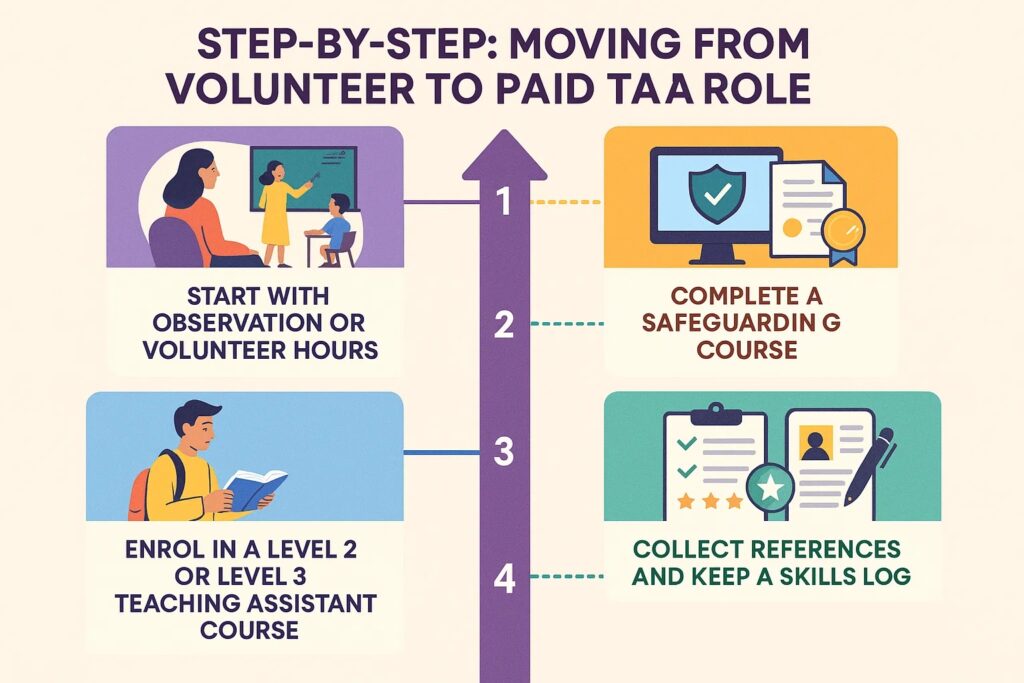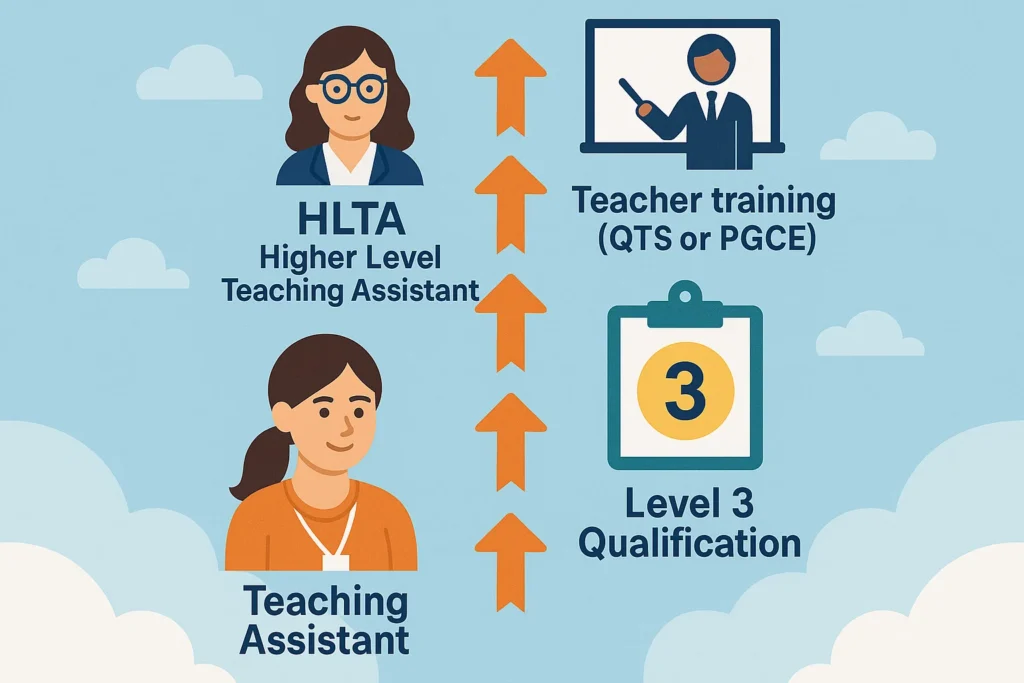If you’ve ever wondered how to become a teaching assistant UK, the good news is it’s simpler than you think. You don’t need to start big — many people begin as volunteers, helping in classrooms and learning how schools work. Step by step, you build confidence, gain experience, and grow into a professional role. Just start small, stay eager to learn, and take clear steps forward: volunteer first, build your skills, collect references, and earn one good qualification to apply for your first TA job.
In this article, we’ll explore how to become a teaching assistant in uk step by step. You’ll learn how to start as a volunteer, build real classroom experience, and gain the right qualifications to land your first job. We’ll also look at what skills schools love to see, what checks you’ll need, and how you can grow into higher TA roles over time.
Why Many Start as Volunteers Before Becoming a Teaching Assistant
Starting as a volunteer is one of the best ways to learn what life in a classroom is really like. Even a few short observation mornings can teach you so much. You’ll see how lessons run, how teachers manage behaviour, and how pupils get the help they need.
How volunteering gives you classroom experience:
- See how lessons run and how daily school routines really work.
- Learn how teachers and assistants help children with different needs.
- Practise staying calm and confident, even on busy school days.
- Discover how teamwork and kindness make every classroom a happier place.
Volunteering helps you build confidence and feel part of the school community. You’ll see what teachers really do and how every small task matters.
Why schools value hands-on practice as much as qualifications:
- Schools trust people who’ve already worked with children in real classrooms.
- Volunteering shows you’re reliable, caring, and willing to learn.
- It proves you can communicate well and fit into the school’s daily life.
- It helps schools see that you share their values and understand their routines.
That’s why many people begin their journey this way — volunteering often opens the door to their first paid teaching assistant job.
How to Become a Teaching Assistant UK?
Before you start applying for TA jobs, it’s good to know what schools look for. The basics are simple, and you can build the rest as you go.
Literacy, numeracy, and safeguarding basics
Most schools ask for GCSE or Functional Skills in English and Maths. These show you can support pupils with reading, writing, and basic number work. You’ll also need to understand the Keeping Children Safe in Education (KCSIE) guidelines. This means being aware, alert, and ready to protect every child in your care.
DBS checks and essential paperwork
Next, you’ll need to complete an enhanced DBS check (children’s barred list). It proves you’re safe to work with children. Start this early because it can take a few weeks to process. You’ll also need:
- A photo ID (like a passport or driving licence)
- Proof of your right to work in the UK
- Proof of your current address
- Two good references — often from a teacher or employer
These small steps show schools that you’re serious and ready to work responsibly.
Optional but helpful qualifications (Level 2 or 3)
While you can start with experience alone, a qualification really helps. The Level 2 Certificate in Supporting Teaching & Learning is a great place to begin. It teaches you the basics of classroom support and builds your confidence.
If you want to go further, the Level 3 Teaching Assistant qualification helps you work more independently, lead small groups, and handle learning interventions. It’s perfect for moving up in your career and taking on more responsibility.
Step by step, these simple requirements bring you closer to becoming a trusted and confident teaching assistant in the UK.
How Volunteering Helps You Stand Out in Applications
Volunteering is a great way to show schools that you care and are ready to work hard. It helps you learn what real classroom life is like and makes your job applications stronger.
Proves commitment to working with children
When you help in a school, keep a small note of what you do. Write down the dates, classes, and jobs you help with — like reading with pupils or supporting a phonics group. This shows you are serious and enjoy working with children.
Builds references and real classroom experience
After about 6 to 8 weeks, ask the class teacher or school leader for a short reference. They can write about your work, your attitude, and how you help in class. These references show schools that you already have real experience and know what happens in a busy classroom.
Shows schools you’re serious about a long-term career
Volunteering tells schools that you want to grow and stay in this career. If you are taking a Level 2 Teaching Assistant course or planning to start one soon, mention it on your CV. It shows you are learning new skills and ready to take the next step.
Every hour you spend helping makes a big difference. You learn, you grow, and you show schools that you’re ready to become a trusted and caring teaching assistant.
Step-by-Step: Moving From Volunteer to Paid TA Role

Turning your volunteer work into a paid teaching assistant job is easier than it seems. You just need to take one small step at a time. Here’s a simple guide to help you get there:
Start with observation or volunteer hours
- Begin by helping at a local school.
- Agree on days and times that work for both you and the school.
- Even a few hours each week can teach you a lot about how classrooms run.
Complete a short safeguarding or child protection course
- Take a short course on child safety — it’s simple but very important.
- You’ll get a certificate that looks great on your CV.
- It shows schools that you know how to keep children safe and happy.
Enrol in a Level 2 or Level 3 Teaching Assistant course
- Join an online or college course while you volunteer.
- The Level 2 course teaches you the basics of classroom support.
- The Level 3 course helps you work more independently and lead small groups.
Collect references and keep a skills log
- Write down what you do each week, like helping with reading or group work.
- Note any skills you learn, such as behaviour support or organisation.
- After a few weeks, ask teachers for short references to include in your job applications.
Apply for entry-level TA roles
- Check local authority, multi-academy trust, or school websites for TA openings.
- Update your CV to show how you’ve helped pupils learn and grow.
- Mention your volunteer work, training, and how you’ve supported learning.
Each step builds your confidence and skills. Step by step, your volunteer hours can turn into a paid, rewarding job as a teaching assistant in the UK.
Do You Need a Placement to Become a Teaching Assistant?
Many people who want to know how to become a teaching assistant UK often ask if a school placement is required. The answer is simple — some courses need it, and some don’t. It depends on the level and type of qualification you choose.
Courses that need classroom practice and those that don’t
Some Level 2 and Level 3 Teaching Assistant courses ask you to spend time in a real school. This helps you learn by doing. You get to see how teachers plan lessons, how pupils learn, and how the classroom runs every day.
But not all courses need this. Some short online courses let you study at home. These are great if you want to learn the basics first or plan to start volunteering later.
How volunteering hours can count for your course
If you already help in a school, that’s great news! Your volunteer hours can count for your course. Keep a simple note of what you do each time — for example:
- Helping with reading or small group work
- Supporting a child who needs extra help
- Talking with teachers and pupils
- Following school safety and safeguarding rules
Your tutor or assessor can use these notes to confirm what you’ve learned.
Volunteering gives you real experience and builds your confidence. Every small task — from helping with reading to setting up lessons — takes you one step closer to becoming a qualified and trusted teaching assistant.
Skills Schools Look for in First-Time TAs
When you apply for your first teaching assistant job, schools want to see more than just your course certificate. They look for simple, real skills that show you care and can work well in a busy classroom.
Patience, teamwork, and clear communication
Patience is one of the most important skills. Every child learns in their own way. Maybe you helped a shy pupil read three pages or supported a child who found maths hard — these small moments show your patience.
Teamwork matters too. You’ll often work with teachers, other TAs, and sometimes parents. Helping set up a lesson or sharing ideas with the teacher shows that you’re a team player who makes the day smoother for everyone.
Clear communication helps you build trust. Speaking kindly, listening carefully, and giving simple instructions make children feel calm and supported.
Supporting SEN students and using IT in class
Many schools include pupils with special educational needs (SEN) such as autism or ADHD. Knowing the basics helps you give better support. You might use gentle reminders, short instructions, or visual aids to help them stay focused.
You’ll also use technology in the classroom. From the interactive whiteboard to pupils’ tablets or laptops, being comfortable with IT helps lessons run smoothly and keeps children engaged.
Reliability and confidence in school routines
Schools love assistants who can be trusted. Being on time, showing up every day, and following school rules show that you are dependable.
It’s also important to know the basics of behaviour, medical, and safety procedures. When you stay calm and follow routines, teachers feel confident leaving you in charge of short tasks. These everyday skills — patience, teamwork, care, and reliability — help you stand out as a first-time TA who’s ready to make a real difference.
Training and Courses to Boost Your Career
If you want to grow as a teaching assistant, the right training can open many doors. Each course helps you build confidence, learn new skills, and move closer to your dream role.
Level 2 Certificate in Supporting Teaching and Learning
This is the best place to start. The Level 2 Certificate gives you quick credibility and helps you move from volunteer work to a paid job. It teaches you the basics of classroom support, child development, and safety. Schools love this qualification because it shows you understand how to help teachers and pupils every day.
Level 3 Diploma or SEN-focused add-ons
Once you have some experience, the Level 3 Teaching Assistant Diploma is your next step. It helps you take on more responsibility, lead small groups, and support pupils with confidence.
You can also add SEN (Special Educational Needs) modules to your learning. These focus on communication, behaviour, and understanding conditions like autism and ADHD. They make you more skilled and ready to support every child’s needs.
Higher Level Teaching Assistant (HLTA) for progression
After gaining solid classroom experience, you can aim to become a Higher Level Teaching Assistant (HLTA). This role offers more independence — leading learning activities, supporting lesson planning, and even covering classes under a teacher’s guidance.
If you’re curious about what this next step looks like, explore our detailed guide: What is a Higher Level Teaching Assistant?. It explains the HLTA role, the skills you’ll need, and how to get qualified.
Each step — from learning to leadership — builds your confidence and career. With the right training, experience, and care, you can create a rewarding path as a teaching assistant.
Salary and Career Growth for Teaching Assistants in the UK
If you want to work as a teaching assistant, it’s good to know how much you can earn and how you can grow in this job. The pay is fair, and there are many ways to move up as you learn more.
Typical starting pay and London weighting
- Most new teaching assistants earn about £12.65 per hour outside London.
- In London, pay is a bit higher — around £13.80 to £14.50 per hour, depending on the school and council.
- This extra pay is called London weighting. It helps cover the higher living costs in the city.
Earning more with skills and roles
- Getting a Level 3 qualification can help you earn more.
- Helping children with special needs (SEN) can also increase your pay.
- Working extra hours before or after school can add to your income.
- Schools like teaching assistants who work hard and support children in different ways.
Routes into HLTA or teacher training

Teaching Assistant → Level 3 Qualification → HLTA (Higher Level Teaching Assistant) → Teacher training (QTS or PGCE)
- Each step gives you more skills and better pay.
- With time, learning, and effort, you can move from helping in class to leading lessons and even becoming a teacher.
Working as a teaching assistant is a great way to start a career in education. Each day helps you learn, grow, and make a real difference in children’s lives.
Final Thoughts: From Giving Time to Building a Career
Becoming a teaching assistant starts small. You can begin by volunteering, learning how classrooms work and helping children every day. Then, get one qualification, collect two references, and apply for local jobs. That’s the simple path from helper to paid teaching assistant.
Every small step matters. Each hour you spend in class builds your skills and confidence.
Start today — do your DBS check, take a short safeguarding course, or email a nearby school to ask about volunteering. One small action can open the door to your new career.
Ready to Start Your Teaching Assistant Journey?
If you dream of working in a classroom and making a real difference, now is the perfect time to begin. The Teaching Assistant Course from Unified Course will help you learn the key skills, build confidence, and get job-ready — all at your own pace.
Start your journey today and take the first step toward a rewarding career as a teaching assistant in the UK. Enrol now and make your classroom dream a reality!
FAQ: How to Become a Teaching Assistant UK – Where Do I Start?
- How long does it take to become a teaching assistant in the UK?
You can start working as a teaching assistant quite quickly if you meet the basic school requirements.
- Can you be a TA with no experience?
Yes, you can. Many people start by volunteering in a school to gain experience and build confidence before applying for paid TA jobs.
- How much do teacher assistants get paid in the UK?
Level 2 teaching assistants usually earn between £18,000 and £20,000 a year, depending on the school and location.
- How much is a TA qualification?
The Introductory Teaching Assistant – Level 2 Course costs just £19, down from the original price of £229.99 — that’s over 87% off!
- How do I become a teaching assistant with no experience in the UK?
You can start by volunteering in a local school to gain experience. Then, apply for TA jobs through schools, local councils, or academy trusts.




